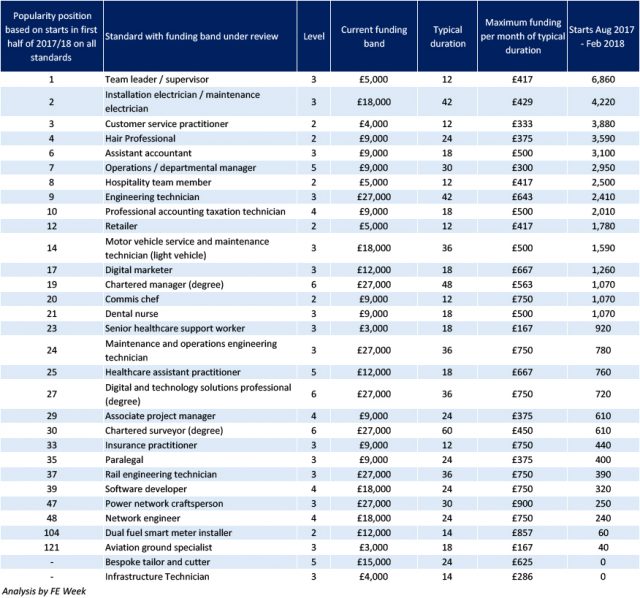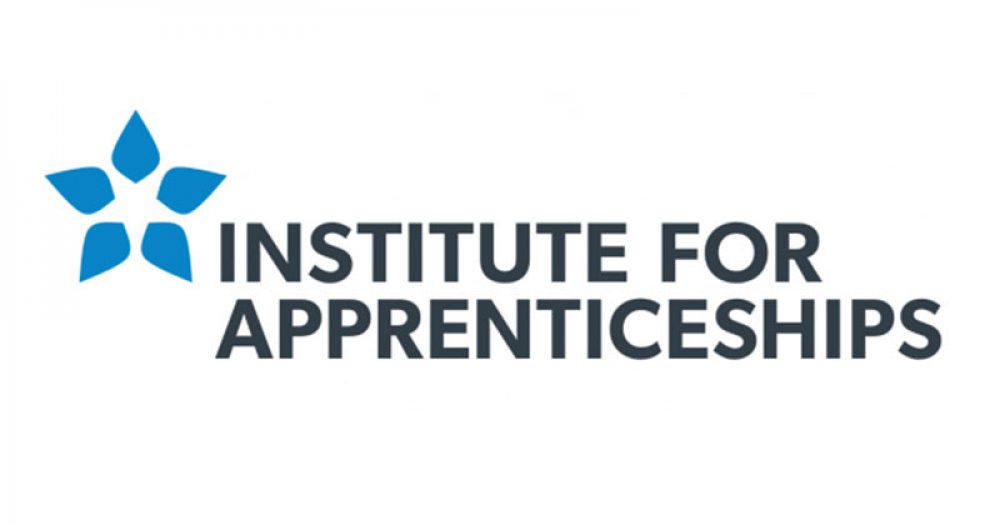The funding rate for the controversial management degree apprenticeship is set to fall, following a review of the most popular standards.
The Institute for Apprenticeships announced today that it will look at 31 standards (see table below), at request from the Department for Education.
The IfA will now have 30 funding bands to choose from – the maximum rate paid for from the levy – up from the current 15.
We will work collaboratively with trailblazers to carry out the review in an open and fair way
FE Week analysis shows that 21 of the 30 standards with the most starts this academic year are among those being reviewed by the IfA.
The 31 involved represents 64 per cent of all starts on standards in the first half of 2017/18 (45,900 out of 71,720).
The chartered management degree apprenticeship is one. Its funding band is already £27,000 – the maximum upper limit, meaning its rate can only fall, which is likely to infuriate the many universities offering the standard.
The team leader/supervisor apprenticeship has been the most popular standard this year with 6,680 starts from August 2017 to February 2018, yet its funding band is also under review.
The move to a 30-band structure gives the IfA more choice regarding the rate it applies to each standard.
Under the 15 structure, if the institute wanted to reduce a £9,000 band it had to drop it to £6,000, for example. But for starts from August it will have the option of setting this to to either £8,000 or £7,000.
Similarly, standards on £27,000 can now drop to £26,000 or £25,000 instead of falling all the way to the previous £24,000.
The IfA admitted in its release about the review that some of the standards involved are among the most popular, and said that others have a low number of starts and “employer feedback suggests” that take up may be restricted by their current funding band.
These are likely to include the infrastructure technician and bespoke tailor and cutter standards which have had no starts so far this year.
The IfA said it will work “collaboratively with trailblazers to carry out the review in an open and fair way”.
The review will “help make sure that employers can access high quality apprenticeships, and that funding bands represent good value for money for employers and government”.
Reviewed funding band recommendations will be made to the DfE, who “take the final decision on all funding bands”.
The DfE announced in February that it would review the funding-band structure, because employers did not “feel able” to negotiate with providers on price.










Speaking as a company that delivers 100+ Electrical Apprenticeships a year it would be very disappointing, not to say difficult if they cut the rate on this Apprenticeship again. When introduced it was first banded at £27K, since then it has reduced to £18K, another cut would mean it was back at the funding level of the old Framework.
I thought the idea of replacing Frameworks with Standards was to improve quality?
Is it going to turn out that we are supposed to improve quality, but do it for the same cost as we did before?
Lets hope sense prevails.
The majority of Levy paying employers that I have spoken to are nowhere near to spending their Levy pot because the appropriate standards/frameworks to meet their business needs are just not available. Cost at this point does not seem to be an issue. The frustrations are due to restrictions on how they can spend their Levy for training a new/developing workforce when the appropriate options do not exist. Aside from this being able to get additional headcounts signed off is another significant factor.
When you discuss trailblazer groups eyes begin to roll as they do not believe they have the skills or time required to achieve this.
The comment that Infrastructure Technician has had no starts this year is not correct.
It may well be the case that the IfA review these standards and decide that they’ve been allocated to the correct band but I expect to see small reductions in those at the top to fund small increases for those at the bottom. Customer Service is likely to receive a boost.
Apart from the impact of the possible cuts it is the timing of this which is an issue. Planning and recruitment for August starts will have happened or be in process already. A £1000 reduction to a £9k standard equates to a 11% cut and if this affects a significant part of your delivery then a provider will have to find savings elsewhere which will impact on quality. It’s unlikely that we will see these prices changes before July so there is no time to respond to this.
The other point is that the rationale for the reduction, according to the IFA publication, is to stimulate growth. But for whom? Levy payers often have more money than they can spend, and co-investors will only be saving £100 for each £1000 knocked off the current rate. Are co-investors happy that for every £100 they save that a further £900 will be removed from the cost of delivery and that this will impact quality? I suspect not and suggest that the real reason for this to make savings on the overall apprenticeship budget.